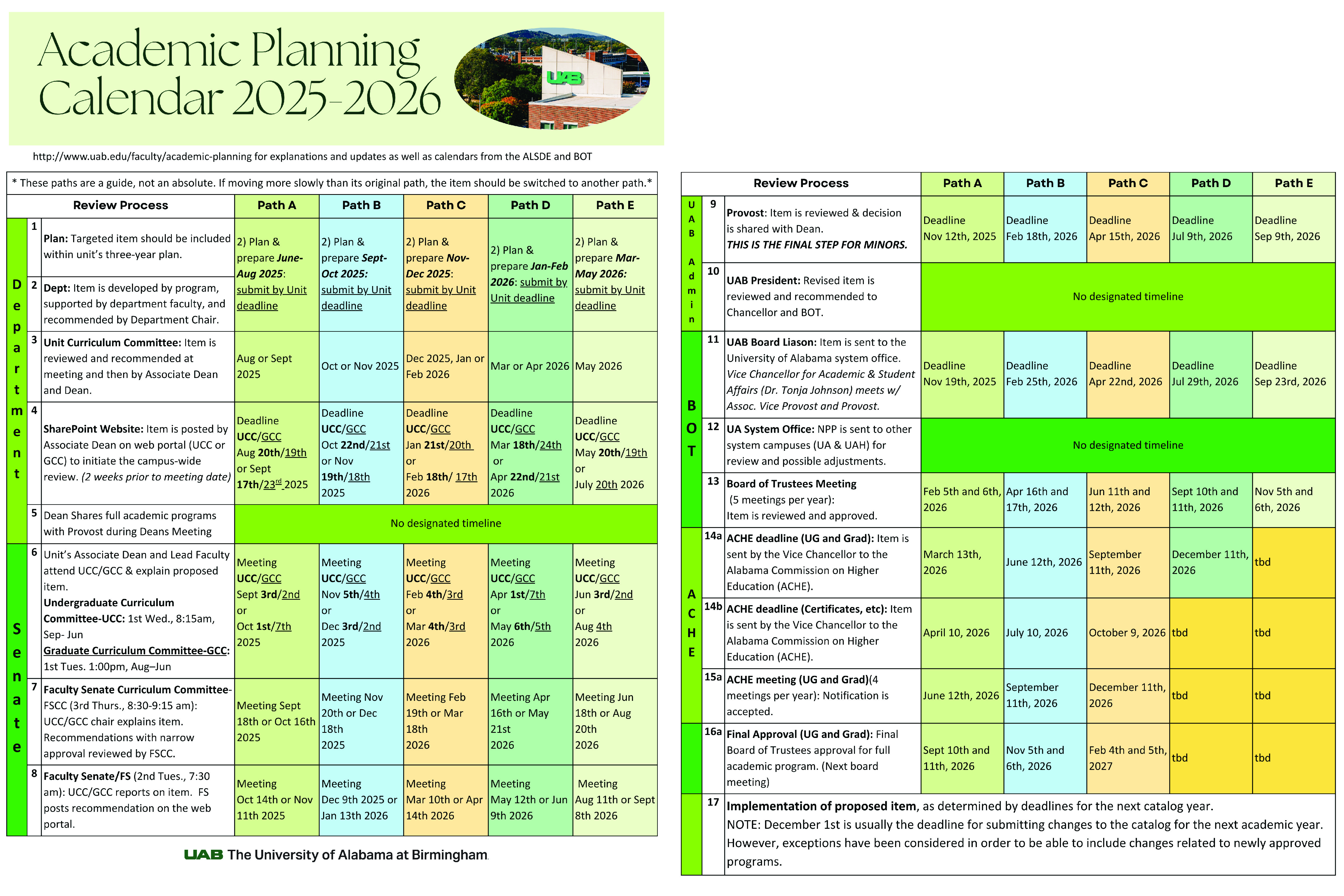-
The Academic Planning Calendar 2025–2026 outlines the pathways for developing academic programs, providing a structured timeline and process for proposing, reviewing, and implementing new academic initiatives. The calendar is organized by month and includes key deadlines for submitting proposals to various review bodies such as department committees, college curriculum committees, the Office of Academic Affairs, and the Alabama Commission on Higher Education (ACHE). Each pathway has a specific final approval date, helping you determine when you can market and recruit for the program or implement the approved changes.

-
Academic Program Review
At the University of Alabama at Birmingham, Academic Program Review is a crucial part of our dedication to continuous improvement, academic excellence, and strategic planning. This process guarantees that each program aligns with institutional goals, meets high standards of quality, and stays responsive to the changing needs of students, employers, and society. Through collaborative assessment and evidence-based reflection, we promote innovation, accountability, and the long-term success of our academic programs.
This process is also required by SACSCOC and the UA Board of Trustees to help academic programs evaluate their strengths and areas for growth in relation to their mission, vision, goals, student success, and student achievement. All academic degree programs are included in this review every eight years, with annual follow-up. Academic Program Review is coordinated by the Office of Institutional Effectiveness and Analysis (IEA).
Conducting regular program reviews is key to satisfying the requirements of the University of Alabama System (UAS), aligning with Board Rule 504 and maintaining high educational standards. Please contact Dr. Katrina Mintz (kmintz@uab.edu) if you have questions about the review process.
Post-Implementation Academic Program Review – UAB APR Guidelines Programmatic Assessment Download Scheduled Program Reviews
CAS = College of Arts and Sciences
JHS = Joint Health Sciences
SEHS = School of Education and Human Sciences
SOE = School of Engineering
SHP = School of Health Professions
Program School APR Cyber Security (M.S.) CAS 2025 Biochemistry and Molecular Genetics (Ph.D.) JHS 2025 Cell Biology (Ph.D.) JHS 2025 Cellular and Molecular Physiology (Ph.D.) JHS 2025 Genetics (Ph.D.) JHS 2025 Microbiology (Ph.D.) JHS 2025 Multidisciplinary Biomedical Science (M.S.) JHS 2025 Accelerated Multidisc Biomedical Sci (M.S.) JHS 2025 Neurobiology (Ph.D.) JHS 2025 Pathology (Ph.D.) JHS 2025 Pharmacology & Toxicology (Ph.D.) JHS 2025 Educational Studies in Diverse Populations (Ph.D.) SEHS 2025 Masters of Engineering (M.Eng) SOE 2025 History (B.A.) CAS 2025 Anthropology Peace & Human Rights (M.A.) CAS 2026 Applied Developmental Psychology (M.S.) CAS 2026 Applied Developmental Psychology (Ph.D.) CAS 2026 Art History (M.A.) CAS 2026 Kinesiology (M.S.) SEHS 2026 Biomedical Engineering (M.S.B.M.E.) SOE 2026 Biomedical Engineering (Ph.D.) SOE 2026 Rehabilitation Science (Ph.D.) SHP 2026 Anthropology (B.A.) CAS 2026 Communication Studies (B.A.) CAS 2026 Criminal Justice (B.S.) CAS 2026 Digital Forensics (B.S.) CAS 2026 Applied Mathematics (Ph.D.) CAS 2027 Behavioral Neuroscience (M.S.) CAS 2027 Cultural Heritage Studies (M.A.) CAS 2027 Learning Design and Learning Sciences (M.S.) - Online SEHS 2027 Civil Engineering (Ph.D.) SOE 2027 Electrical & Computer Engineering (M.S.E.C.E) SOE 2027 English (B.A.) CAS 2027 Genetic & Genomic Sciences (B.S.) CAS 2027 International Studies (B.A.) CAS 2027 Medical Sociology (B.S.) CAS 2027 Behavioral Neuroscience (Ph.D.) CAS 2028 Biology (M.S.) CAS 2028 Interdisciplinary Engineering (Ph.D.) SOE 2028 Master of Science in Engineering Management (M.S.E.M.) SOE 2028 Mathematics (B.S.) CAS 2028 Natural Science (B.S.) CAS 2028 Biology (Ph.D.) CAS 2029 Communication Management (M.A.) CAS 2029 Materials Engineering (M.S.Mt.E) SOE 2029 Neuroscience (B.S.) CAS 2029 Philosophy (B.A.) CAS 2029 Computer Science (M.S.) CAS 2030 Computer Science (Ph.D.) CAS 2030 Materials Engineering (Ph.D.) SOE 2030 Materials Science (Ph.D.) SOE 2030 Physics (B.S.) CAS 2030 Political Science (B.A.) CAS 2030 Criminal Justice (M.S.C.J.) CAS 2031 Data Science (M.S.) CAS 2031 English (M.A.) CAS 2031 Mechanical Engineering (M.S.M.E) SOE 2031 Mechanical Engineering (Ph.D.) SOE 2031 Psychology (B.S.) CAS 2031 Sociology (B.A.) CAS 2031 World Languages and Literatures (B.A.) CAS 2031 History (M.A.) CAS 2032 Mathematics (M.S.) CAS 2032 Neuroengineering (Ph.D.) SOE 2032 Physics (M.S.) CAS 2033 Physics (Ph.D.) CAS 2033 Psychology (M.A.) CAS 2034 Public Administration (M.P.A.) CAS 2034 Sociology (M.A.) CAS 2035 -
Creation, Revision, or Closure of Academic Degree Programs
This tab serves as your centralized resource for faculty and administrators involved in the creation, revision, or closure of full academic degree programs. Here, you’ll find all the necessary forms, templates, and guidance to support both internal university workflows and external reporting requirements. Whether you are proposing a new degree program, updating an existing one, or initiating program closure, this resource provides comprehensive support throughout the process. Additionally, it includes detailed information on dual, joint, and collaborative academic programs, along with sample Memorandums of Understanding, all aligned with the SACSCOC Substantive Change Policy to ensure compliance and institutional integrity.
-
Certificate Programs
This tab serves as your centralized resource for faculty and administrators involved in the development, modification, or discontinuation of academic certificate programs. It provides access to all required forms, templates, and guidance to support both internal university processes and external compliance requirements. Whether you are proposing a new certificate, updating an existing one, or initiating its closure, this site offers comprehensive support throughout the entire lifecycle.
-
Other Additions/Alterations
New Option for Existing Program Notification New Academic Department New Academic Courses -
Substantive Change
Substantive change refers to significant modifications or expansions in an institution’s academic offerings or operations that require notification or approval from SACSCOC. Currently, SACSCOC identifies 52 categories of substantive change, each tied to federal regulations that govern institutional accreditation. As such, both UAB policies and SACSCOC guidelines must be followed to ensure compliance. This section provides essential information and resources to help faculty and administrators navigate the substantive change process. Changes impacting full academic degree programs and certificate programs are addressed in their respective tabs. If you have questions or need to discuss a potential substantive change, please contact UAB’s SACSCOC Institutional Accreditation Liaison, Dr. Katrina Mintz, at kmintz@uab.edu.